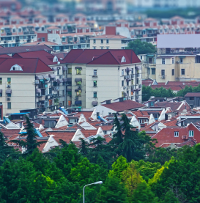17 July 2014
A new generation of scenarios for climate research
A special issue of the journal Climatic Change provides the first in-depth documentation of the Shared Socioeconomic Pathways (SSPs), the next generation of scenarios for climate change research.
For the past two decades, climate scientists have mainly used scenarios developed for the IPCC Special Report on Emissions Scenarios (SRES) in 2000. However researchers recognized the need to bring new knowledge and data to the process of scenario development. Utilizing integrated assessment models and combining socio-economic and climate change impacts to look into the stabilization of climate change.
“This publication represents a major leap for socio economic and climate change scenarios, providing the background, methods, and future plans on development of the SSPs, which are now available for use by researchers worldwide,” says IIASA Deputy Director General and Deputy CEO Nebojsa Nakicenovic, who co-edited the special issue along with Robert Lempert of the RAND corporation, and Anthony Janetos, Director of the Pardee Center for the Study of the Longer-Range Future at Boston University. IIASA Energy Program Director Keywan Riahi co-authored a number of papers within the special issue (see references below).
What’s a scenario?
In order to model future climate change, scientists need to develop a range of future greenhouse-gas emissions. But emissions depend on many drivers including population dynamics, economic development, and technological change. So scientists turned to scenarios developed through Integrated Assessment Models, which combine information about fossil fuel burning, land use change, and energy system development, such as the scenarios developed for the IPCC SRES in 2000.
The SSPs represent a leap forward for climate research, bringing together three scientific communities who worked together in their development: climate mitigation researchers, climate modelers, and impacts, adaptation, and vulnerability researchers. The result of this interdisciplinary cooperation is that Representative Concentration Pathways (RCPs) were developed at the same time as the SSPs in order to provide a quicker method for scenarios to reach climate modelers, because scientists in the different communities have worked in parallel and in concert. The output is a complete set of scenarios that can be used by researchers in many different fields, allowing scientists to run models based on consistent underlying assumptions related to population, land use change, economic growth, technology, and other factors that influence greenhouse gas emissions.
In particular, the IPCC Fifth Assessment Report (AR5) relied on climate trajectories that were generated using the RCPs. The RCPs can now be combined with the SSPs. The RCPs span a range of possibilities between a future without mitigation of greenhouse gasses during this century to alternative futures with ambitious climate policy. This parallel process, of integrating the SSPs and RCPs enables a much broader assessment of the impacts and vulnerabilities associated with the global transformation.
The papers in the special issue describe the nuts and bolts of the SSPs – the methods by which they were developed—as well as challenges and concepts for future work. IIASA has been a hub for the SSP development process, with scientists from the Ecosystems Services and Management, Energy, Risk, Policy and Vulnerability, Transitions to New Technologies, and World Population programs intimately involved in the work. For example, IIASA Energy Program Director Keywan Riahi served as a co-chair on SSP scenarios working groups of the Integrated Assessment Modeling Consortium (IAMC) and on the International Committee On New Integrated Climate change Assessment Scenarios (ICONICS), an international group involved in the SSP scenario process in order to facilitate interdisciplinary research and assessment on climate change mitigation and adaptation. The results of this process will be published in an upcoming issue of the journal Global Environmental Change. For more details on the development of the SSPs and contributions of these programs please read: Climate change and socioeconomic development.
Read more about the SSPs
Shared Socioeconomic Pathways: Linking climate
change & socioeconomic development
Options Magazine, Summer 2012: A new cooperative scenarios framework puts climate change into the context of human socioeconomic development, to support the next generation of climate models. More
References
Special Issue:
Nakicenovic N, Lempert RJ, Janetos A., eds. 2014. A Framework for the Development of New Socio-economic Scenarios for Climate Change Research. Climatic Change.
https://previous.iiasa.ac.at/publication/more_XJ-14-065.php
Relevant articles:
Nakicenovic N, Lempert RJ, Janetos A.2014. A framework for the development of new socio-economic scenarios for climate change research: Introductory essay. Climatic Change, 122(3):351-361. https://previous.iiasa.ac.at/publication/more_XJ-14-038.php
Ebi, K., Hallegatte, S., Kram, T., Arnell, N., Carter, T., Edmonds, J., Kriegler, E., Mathur, R., O’Neill, B., Riahi, K., Winkler, H., Vuuren, D., Zwickel, T., 2013. A new scenario framework for climate change research: background, process, and future directions. Climatic Change. http://previous.iiasa.ac.at/publication/more_XJ-14-039.php
Vuuren, D., Kriegler, E., O’Neill, B., Ebi, K., Riahi, K., Carter, T., Edmonds, J., Hallegatte, S., Kram, T., Mathur, R., Winkler, H., 2013. A new scenario framework for Climate Change Research: scenario matrix architecture. Climatic Change. https://previous.iiasa.ac.at/publication/more_XJ-14-037.php
O’Neill, B., Kriegler, E., Riahi, K., Ebi, K., Hallegatte, S., Carter, T., Mathur, R., Vuuren, D., 2013. A new scenario framework for climate change research: the concept of shared socioeconomic pathways. Climatic Change. https://previous.iiasa.ac.at/publication/more_XJ-14-035.php
Kriegler, E., Edmonds, J., Hallegatte, S., Ebi, K., Kram, T., Riahi, K., Winkler, H., Van Vuuren, D.P., 2013. A new scenario framework for climate change research: The concept of Shared Climate Policy Assumptions. Climatic Change, doi:10.1007/s10584-013-0971-5. https://previous.iiasa.ac.at/publication/more_XJ-14-040.php
CONTACT DETAILS
Distinguished Emeritus Research Scholar Transformative Institutional and Social Solutions Research Group - Energy, Climate, and Environment Program
Program Director and Principal Research Scholar Energy, Climate, and Environment Program
Principal Research Scholar Integrated Assessment and Climate Change Research Group - Energy, Climate, and Environment Program
Principal Research Scholar Pollution Management Research Group - Energy, Climate, and Environment Program
Principal Research Scholar Sustainable Service Systems Research Group - Energy, Climate, and Environment Program
IPCC on Twitter
#ipcc Tweets



